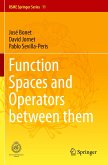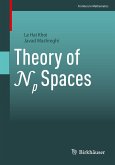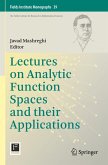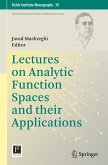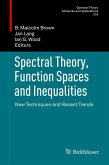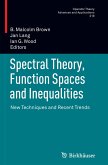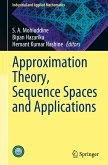The aim of this work is to present, in a unified and reasonably self-contained way, certain aspects of functional analysis which are needed to treat function spaces whose topology is not derived from a single norm, their topological duals and operators between those spaces. We treat spaces of continuous, analytic and smooth functions as well as sequence spaces. Operators of differentiation, integration, composition, multiplication and partial differential operators between those spaces are studied. A brief introduction to Laurent Schwartz's theory of distributions and to Lars Hörmander's approach to linear partial differential operators is presented.
The novelty of our approach lies mainly on two facts. First of all, we show all these topics together in an accessible way, stressing the connection between them. Second, we keep it always at a level that is accessible to beginners and young researchers. Moreover, parts of the book might be of interest for researchers in functional analysis and operator theory. Our aim is not to build and describe a whole, complete theory, but to serve as an introduction to some aspects that we believe are interesting. We wish to guide any reader that wishes to enter in some of these topics in their first steps. Our hope is that they learn interesting aspects of functional analysis and become interested to broaden their knowledge about function and sequence spaces and operators between them.
The text is addressed to students at a master level, or even undergraduate at the last semesters, since only knowledge on real and complex analysis is assumed. We have intended to be as self-contained as possible, and wherever an external citation is needed, we try to be as precise as we can. Our aim is to be an introduction to topics in, or connected with, different aspects of functional analysis. Many of them are in some sense classical, but we tried to show a unified direct approach; some others are new. This is why parts of these lectures might be of some interest even for researchers in related areas of functional analysis or operator theory. There is a full chapter about transitive and mean ergodic operators on locally convex spaces. This material is new in book form. It is a novel approach and can be of interest for researchers in the area.
The novelty of our approach lies mainly on two facts. First of all, we show all these topics together in an accessible way, stressing the connection between them. Second, we keep it always at a level that is accessible to beginners and young researchers. Moreover, parts of the book might be of interest for researchers in functional analysis and operator theory. Our aim is not to build and describe a whole, complete theory, but to serve as an introduction to some aspects that we believe are interesting. We wish to guide any reader that wishes to enter in some of these topics in their first steps. Our hope is that they learn interesting aspects of functional analysis and become interested to broaden their knowledge about function and sequence spaces and operators between them.
The text is addressed to students at a master level, or even undergraduate at the last semesters, since only knowledge on real and complex analysis is assumed. We have intended to be as self-contained as possible, and wherever an external citation is needed, we try to be as precise as we can. Our aim is to be an introduction to topics in, or connected with, different aspects of functional analysis. Many of them are in some sense classical, but we tried to show a unified direct approach; some others are new. This is why parts of these lectures might be of some interest even for researchers in related areas of functional analysis or operator theory. There is a full chapter about transitive and mean ergodic operators on locally convex spaces. This material is new in book form. It is a novel approach and can be of interest for researchers in the area.
"This essentially self-contained book is concerned with the study of spaces of (differentiable) functions and linear operators between them. For the operators the focus is on linear dynamics and partial differential operators. The book is addressed to master students, and the topics are presented in a very accessible way." (Christian Bargetz, zbMATH 1545.46001, 2024)


